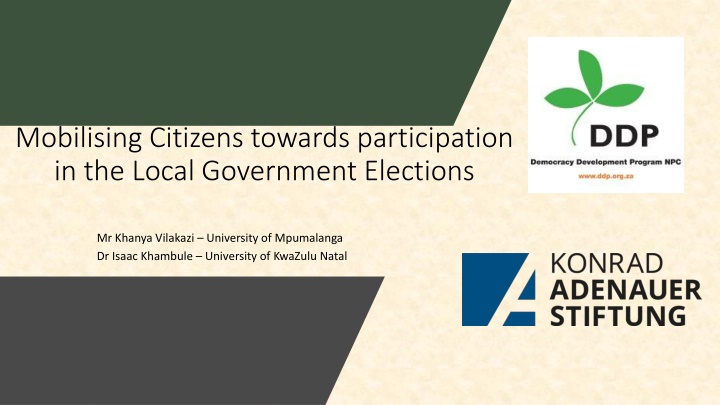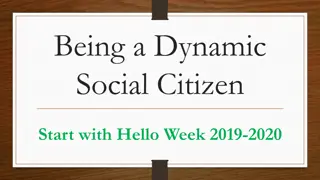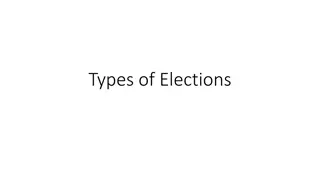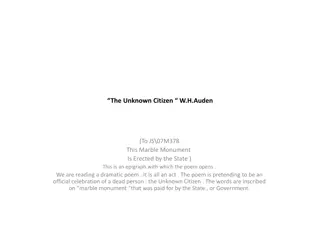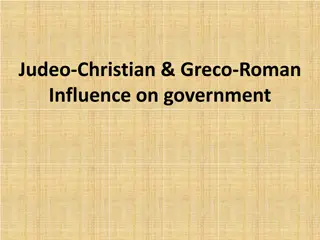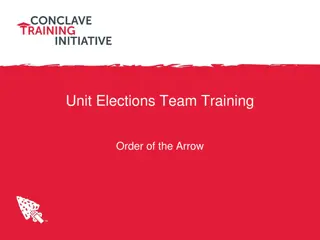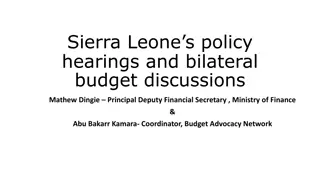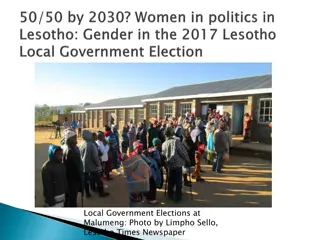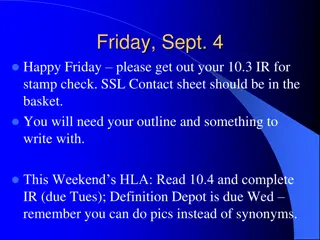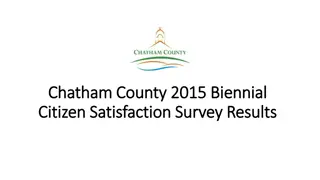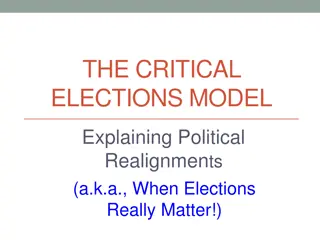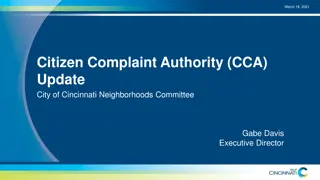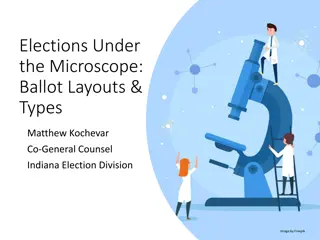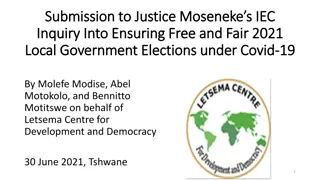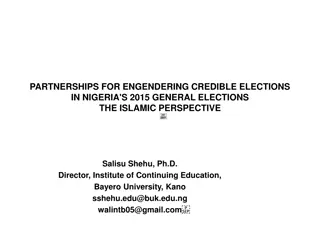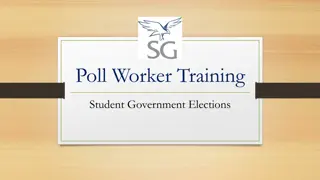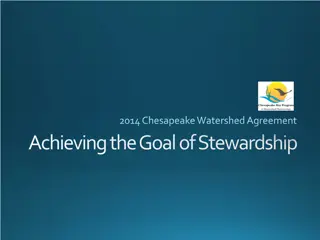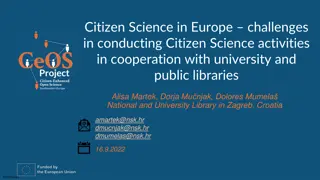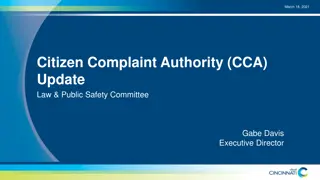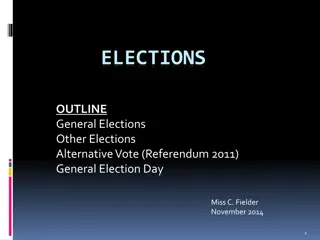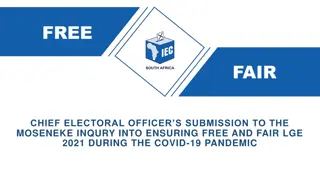Enhancing Citizen Participation in Local Government Elections
Mobilising citizens towards active participation in local government elections is crucial for strengthening democracy. The political landscape in South Africa challenges the traditional systems, highlighting the need for reform and increased accountability. The role of the premium citizen, who holds representatives accountable and champions electoral literacy, is vital in shaping the future of governance.
Download Presentation

Please find below an Image/Link to download the presentation.
The content on the website is provided AS IS for your information and personal use only. It may not be sold, licensed, or shared on other websites without obtaining consent from the author.If you encounter any issues during the download, it is possible that the publisher has removed the file from their server.
You are allowed to download the files provided on this website for personal or commercial use, subject to the condition that they are used lawfully. All files are the property of their respective owners.
The content on the website is provided AS IS for your information and personal use only. It may not be sold, licensed, or shared on other websites without obtaining consent from the author.
E N D
Presentation Transcript
Mobilising Citizens towards participation in the Local Government Elections Mr Khanya Vilakazi University of Mpumalanga Dr Isaac Khambule University of KwaZulu Natal
Active citizen The Social contract The Constitution of the Republic of South Africa centers around the individual and how individual people constitute a collective which becomes the bedrock of democracy. Its only through such envisioned individuals that a democracy such as ours can be truly tested, shaped and reconfigure with each day. Active at a local level with local societal issues Holding the custodians of this society accountable
Political landscape Proportional representation adopted in the 1993 interim constitution. Multi-party in nature but has proven to be a one-party dominant thus far with a few exceptions at Local government. Legislatively MP s remain the servants to their electable party s Tangible accessibility to public representative remain archaic in nature. At a local level representatives at times become illusive creators that have unending powers through speech. Perception of a political system failure by individual citizens has resulted in an inactive citizenry.
Where did we go wrong Failure to change the political system form a transitional society into a developing society. What is also clear is that a significant majority of voters wanted closer interaction with the politicians who represent them. Thus 71% said they wanted to vote for a candidate from the area where they lived, 64% that MPs should live close to the people they represent and 53% that party candidates should be chosen by party members rather than party leaders (Report, 2003). All parties were in favor of some system of proportional representation. The governing party, the African National Congress, favored the retention of the current system, as did the African Christian Democratic Party, the Afrikaner Eenheidsbeweging, the Freedom Front, the New National Party and the United Christian Democratic Party. On the other hand, the Democratic Party, the Federal Alliance, the Inkatha Freedom Party, the Pan Africanist Congress and the United Democratic Movement favored a move towards a multi-member constituency system, while the Azanian People s Organization favored a first-past-the-post constituency system for 50% of National Assembly seats and proportional representation for the remaining 50%
The premium citizen People in this room. Those that challenge each and every action of public representatives. Well informed through proper means of knowledge. Active in all spheres of governance as a citizen. Able to hold the constitution and its prescripts to a higher order than any affiliation.
The role to be played Active participation. Community mobilization. Electoral literacy. Effective systematic measure for engaging participants of the Republic. A Nonpartisan media reporting.
The challenge of self Is the party or organization that you represent equal to the challenge of empowering citizens? Does the fear of accountability threaten the position of that your party/ organization have? No entity can over-haul a democratic system, it is the Citizens of the system that should ensure that the system is competitive and desirable.
Group Discussions Group Discussions What hinders active participation in elections? Why is it difficult to mobilize citizens? How can we encourage active citizenry?
Local government and the decline in Local government and the decline in voting (causes and consequences) voting (causes and consequences)
Discussion Should SA only have a singular election? Is the electoral system conducive to participation?
Electoral challenges and Electoral challenges and changes: What would make changes: What would make people vote? people vote?
Development of an active citizenry in South Africa amid a Pandemic
Developing an Active Citizenship Developing an Active Citizenship Active citizenship sustains and promotes democracy (Hoskins, 2014) Good for Governance, transparency, and ethical governance Promotion of responsible citizens
Understanding the challenges Understanding the challenges Lack of alternative political parties -Declining voter turnout -Lack of trust in ward councillors how do we change this? -Electoral changes? -Imposition of candidates how are leaders elected?
Crafting Solutions Crafting Solutions Ward-based manifesto dialogues (political engagements) Make people take ownership of local spaces Promote bottom-up civic education Community involvement
Group discussion Group discussion Does the political system require change and how can we improve it? Will independent candidates shift electoral outcomes? What are the pitfalls of voting during a pandemic?
What to expect leading to the What to expect leading to the local government elections local government elections 2021? 2021?
The battlegrounds The battlegrounds Nelson Mandela bay Metro ANC (50) DA (57) EFF (6) Joburg Metro ANC (121) DA (104) EFF (30) Tshwane Metro ANC (89) DA (93) EFF (25)
The return of the old The return of the old Nationalism Zulu Nationalism Afrikaner Nationalism
The Test of time The Test of time The EFF at a local level The UDM The ANC The DA The IFP
